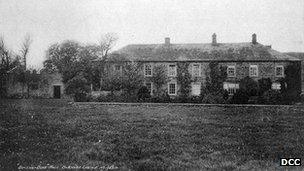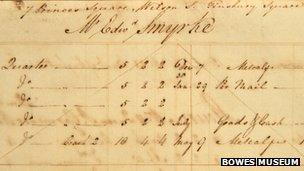Exhibition explores Charles Dickens' links with County Durham
- Published

Bowes Academy has now been divided into seven flats and has been named Dotheboys Hall
An exhibition exploring the links between Charles Dickens and County Durham is on display.
The display of documents, photographs and press cuttings looks into Dickens' connections with the Barnard Castle which he visited in February 1838 when he was researching Nicholas Nickleby.
The exhibition at Durham County Record Office coincides with the 200th anniversary of his birth on 7 February.
Dawn Layland, Durham County Record Office education archivist, said: "A lot of people don't realise that Dickens had any connection to County Durham... when the novel was published, it had a huge impact on the schools and community of that area."
Many people believe that the character of Wackford Squeers in Nicholas Nickleby was inspired by William Shaw, who was the headmaster of Bowes Academy in the 1830s.
The school was also said to be the basis for the author's depiction of Dotheboys Hall.
Charles Dickens visited the town with illustrator Hablot K. Browne to research boarding schools in the north-east of England for the book.
These boarding schools were known at the time as "Yorkshire Schools" and had a reputation as being places to send unwanted or illegitimate children for a cheaper rate, with an emphasis on work and no holidays.
Dickens and Mr Browne visited a lawyer on their visit, pretending they were trying to find a suitable school for a widowed friend's sons.

A ledger showing the names and costs from Bowes Academy is on display at Bowes Academy
In a letter from Dickens in 1838, he replies to a lady called Mrs. Hall who had written to him saying she thought he had exaggerated the school's treatment of its pupils in the book.
He states: "... the rascalities of those York-shire Schoolmasters cannot easily be exag-gerated, and that I have kept down the strong truth and thrown as much comicality over it as I could, rather than disgust and weary the reader with its fouler aspects".
He also states the lawyer he met told them the schools were "sad places" and advised them to "fling them in any way upon the mercy of the World - rather than trust them here".
It was this reputation that formed the basis of Nicholas Nickleby.
Following the publication of the book and its bad exposure of the Yorkshire Schools, most of them were closed down, including Bowes Academy.
Dr Tony Williams, associate editor of The Dickensian and honorary life member of The International Dickens Fellowship, says the mistreatment of boys made Dickens angry and he wanted to "exploit" the schools' reputation in his work.
However, Dr Williams says "we must remember these are works of fiction".
'Duly proud'
Dickens briefly met William Shaw on 2 February when he went to Bowes Academy but he was quickly ushered away when somebody revealed his identity.
It is believed this brief meeting inspired the character of Wackford Squeers, who both share the same initials and also similarities in their appearance.
In the same letter from 1838, he mentions his meeting with Mr Shaw, whom he describes as a "scoundrel".
.jpg)
A newspaper article by a former pupil defending Bowes Academy
However, William Shaw's family, and in particular his great-great-grandson Ted Shaw, have always defended his character.
Mr Shaw will be holding a talk on 19 March at Hamsterley Village Hall as part of the Dickens in Teesdale, external year-long festival of events.
Another connection with the town is the character of Smike, who is said to have been based on the grave of George Ashton Taylor, a boy who died at Bowes Academy.
Dickens refers to visiting the boy's grave in a letter: "... the first gravestone I stumbled on that dreary winter afternoon was placed above the grave of a boy, eighteen long years old, who had died suddenly... died at that wretched place. I think his ghost put Smike into my head, upon the spot."
Dickens in Durham is on display at Durham County Record Office until the end of March.
The Bowes Museum, external is also holding a series of events and an exhibition to mark the writer's anniversary, including talks from Dickens' great-great-grandson Gerald Dickens, and the great-great-granddaughter of Hablot Browne, Valerie Browne Lester.
Vivien Vallack, head of exhibitions at the museum, said: "We can certainly be duly proud of the part our town and the dale played in helping inspire and create that novel.
"Dickens' books are loved worldwide and so on this 200th anniversary it is important to recognise the modest but important part we played in the literary output of one of the world's favourite authors."
- Published11 January 2012
- Published16 January 2012